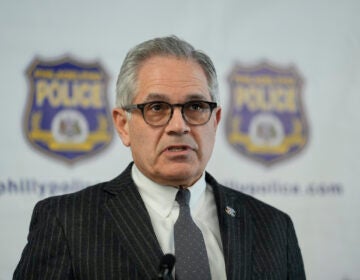Roxborough’s Bridge Way School uses art to teach recovery as a series of steps
Amid a collection of scattered aluminum foil boxes, plaster gauze strips and paint, five students crafted animals.
At the Bridge Way School in Roxborough, art has been yet another form of recovery for students reclaiming sober lifestyles after a history of drug and alcohol abuse.
The school, which opened in September, is Philadelphia’s first recovery school geared toward helping high school students remain sober after completing rehabilitation from substance abuse. Students at Bridge Way must have at least 30 days of sobriety and must be actively on a recovery program. They are required to stay for at least a 90-day semester and attend 12-step meetings, like Alcoholics Anonymous, after dinner in their neighborhoods. They also hold morning meditations before the school day and “check out” at the end of the day, explaining their plans for the night.
“It’s so different. There’s less drama. We’re kind of like one big family,” Molly, a student, said as she painted a miniature hippopotamus. (The last names of the students in this article have been concealed for privacy reasons.)
The art class has been working on animal sculptures molded from aluminum foil and covered with plaster gauze strips.
Art teacher, Mindy Flexer, believes “art is a good template for how life works. Things of value are not created instantaneously. Each step builds on the last step.”
The students have already gained more self-confidence in the drawing phase of the animal project, she said. Some of them were surprised they could draw so well and felt liberated by the organic nature of the class.
“In math you can be wrong, in art you can’t,” student Bree said as she smoothed a wet strip of plaster gauze over a miniature seal.
Though the art classes help to engage the students in a soothing atmosphere, they still encounter temporary moments of frustration along the path of recovery.
“Let’s just say I have my anger attacks, and if it wasn’t for Pete I probably would have been out of here, probably in jail because I’m on probation. Pete talked me out of a lot, made me think a little bit,” student Tyler said of Peter McGovern, Bridge Way’s clinical director.
Eight out of 10 students who return to their prior school after rehabilitation, relapse within six months, said head of school Rebecca Bonner. But at recovery schools like Bridge Way, they stay sober longer. “There’s early research out there that shows that kids who have attended a sober school, a recovery high school, for a minimum of a semester are able to sustain sobriety eight times longer than they could before treatment, and that translates to 260 plus days, which, for a teenager, is an amazing amount of time to be sober,” she said.
The school currently has six students, but Bonner said they are prepared to serve 10 to 12 for this year. They hope to have 25 to 30 students by year three. The school would cap at 50 students. So far, the school has had two students complete the 90 days of sobriety.
“Relapse can be part of the disease so that even when it does come, the kids have had a significant amount of time under their belts to develop the skills to get back on track,” Bonner said.
Though Bridge Way is the first of its kind in Philadelphia, the U.S. has 25 others. The school is run by the Greater Philadelphia Association for Recovery Education and is located on the second floor of the Mishkan Shalom Synagogue on Freeland Avenue in Roxborough. The school rents the space; they are not affiliated with the synagogue.
WHYY is your source for fact-based, in-depth journalism and information. As a nonprofit organization, we rely on financial support from readers like you. Please give today.




